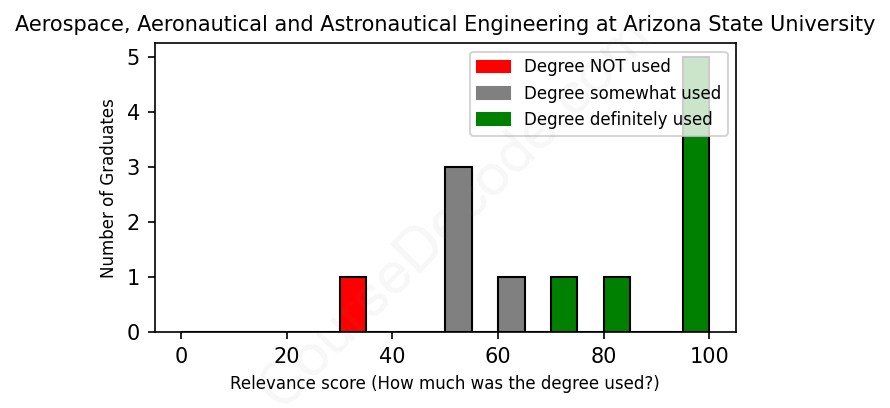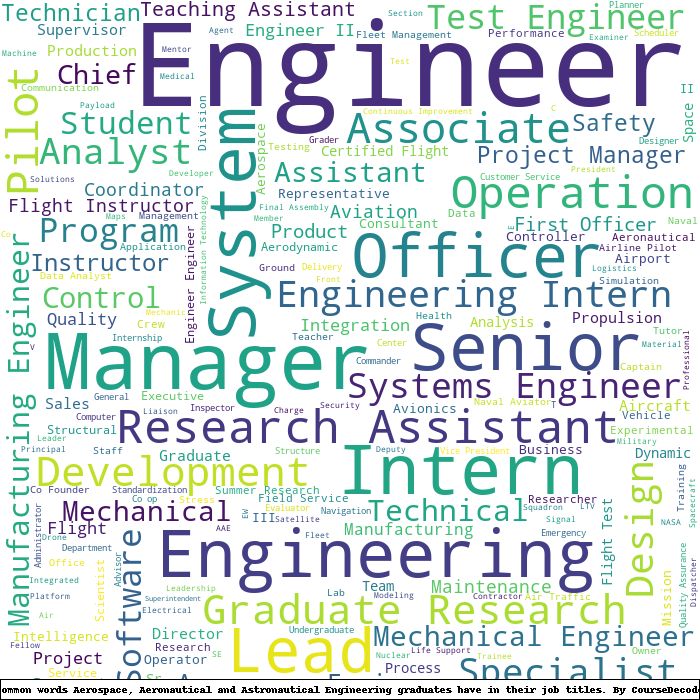
First, some facts. Of the Aerospace, Aeronautical and Astronautical Engineering graduates from Arizona State University we've analyzed , here's how many have used (or NOT used) their degree in their career:

These are estimates based on AI analysis of 12 LinkedIn profiles (see below).
The verdict? Above average. Overall, with an average relevance score of 74%, Aerospace, Aeronautical and Astronautical Engineering graduates from Arizona State University have a higher likelihood (+7%) of finding work in this field compared to the average graduate across all fields:
And for comparison, here's the chart for all profiles we've looked at across all degrees.
Also, after graduating, only 33% of these graduates have pursued further education other than another Bachelor's degree (such as a Masters degree or other), compared to the average across all profiles of 35%. This suggests a Bachelors degree is enough for most Aerospace, Aeronautical and Astronautical Engineering graduates, and it's normal to look for work straight after graduation.
See the details:
|
Relevance score: 33% We think this person has NOT gone into a career related to their degree. We think this person has NOT gone into a career related to their degree.
DEGREE INFOGraduated in 2023 from Arizona State University with a Bachelor of Science - BS in Aerospace, Aeronautical and Astronautical Engineering. Also pursued further education since (see below). JOB HISTORY SINCE GRADUATIONStudent San Diego State University Aug 2023 - Present Digital Systems & Intelligent Machines Laboratory  San Diego State University Feb 2024 - Present FURTHER DEGREES DONE SINCE GRADUATINGMastersSan Diego State University 2023 - 2025 ABOUTPursuing a Masters in Mechanical Engineering at San Diego State University, with a Bachelor of Sciencein Aerospace Engineering from Arizona State University. Willing to learn and eager to gain hands-onexperience in industry. Reliable worker with strong communication skills and a can do attitude. |
The top 10 most common jobs done by the graduates we've analyzed (ranked most common to least) are:
Looking at the job trajectories of folks who graduated with a degree in Aerospace, Aeronautical, and Astronautical Engineering from Arizona State University, it seems like the most common positions are in engineering roles, especially system engineering and manufacturing engineering. Many graduates landed jobs at major aerospace companies like Boeing and Lockheed Martin, where their educational background directly applies to their daily responsibilities. These roles often allow them to use the specialized knowledge gained during their studies to solve real-world problems in aerospace systems and design.
However, it’s also clear that not every job these graduates took up is directly related to aerospace. Some positions like Mechanical Engineer or Project Manager, while they may involve overlapping skills, don’t fully leverage the specific aerospace knowledge that they acquired. Others, like a role as a Certified Flight Instructor, apply more to aviation aspects rather than engineering. Overall, though, a good portion of graduates have been able to secure relevant positions in their field, showcasing the strong connection between their studies and the job market in the aerospace industry.
Here is a visual representation of the most common words in job titles for Aerospace, Aeronautical and Astronautical Engineering graduates (this is across all Aerospace, Aeronautical and Astronautical Engineering graduates we've analyzed, not just those who went to Arizona State University):

Graduates with a degree in Aerospace, Aeronautical, and Astronautical Engineering from Arizona State University tend to find themselves on promising career paths that are relevant to their field of study. Many of their first jobs after graduation are often with well-known companies in the aerospace sector, like Boeing, Lockheed Martin, and Honeywell. For instance, a 2012 graduate started as a system engineer at Honeywell and has climbed the ranks to work at Boeing, which suggests that early roles are typically engineering-focused and provide a solid foundation for future growth. A lot of the 2019 graduates began their careers in manufacturing or systems engineering, with a consistent trend of moving up in responsibility and specialization, like transitioning from manufacturing engineer roles to higher-level engineering positions. This indicates that graduates are generally aligning their initial job choices with their aerospace training, leading to careers that are both meaningful and vertically progressive.
Looking five to ten years down the line, many alumni have secured roles that deepen their expertise in engineering, project management, and research. A notable number of them continue in aerospace with companies like Lockheed Martin and Boeing, indicating a strong retention in the industry. However, there are also graduates who seem to have shifted into other relevant fields, like construction management, which can be seen in the 2019 graduate who started as a superintendent and is now a project manager. While there are a few scattered careers that stray from traditional aerospace roles, the overall trend displays a healthy link between their degree and their job trajectory. The data suggests that with a degree from Arizona State University, many students tend to carve out successful careers within engineering disciplines that are closely aligned with aerospace, bolstered by the support of reputable companies known for their commitment to innovation and engineering excellence.
Getting a Bachelor's degree in Aerospace, Aeronautical, and Astronautical Engineering can be pretty challenging, and this is generally true at Arizona State University as well. The coursework involves a lot of complex math, physics, and engineering principles, so if you're not super comfortable with those subjects, it can feel pretty overwhelming. You'll also have to tackle a lot of hands-on projects and lab work, which can be time-consuming and demanding. Overall, it tends to be on the harder side compared to many other degrees, so be ready to put in some serious effort and time if you decide to go down this path!
Most commonly, in the LinkedIn profiles we've looked at, it takes people 4 years to finish a Bachelor degree in Aerospace, Aeronautical and Astronautical Engineering.
Looking at the career paths of these Arizona State University graduates in aerospace, aeronautical, and astronautical engineering, it seems like they've generally been doing pretty well financially, especially in comparison to the national average for recent grads. The ones working at big names like Honeywell, Boeing, and Lockheed Martin are likely pulling in solid salaries right out of school, particularly with their advanced engineering roles. Even the graduates from 2019 who became project managers and superintendents show that there’s room for growth and good pay in the industry. Of course, some are still early in their careers, like the one currently in school or those who've just landed their first jobs, but overall, it seems like a good bet that these folks are making decent money.
Here is a visual representation of the most common words seen in the "about" section of LinkedIn profiles who have a Bachelor degree in Aerospace, Aeronautical and Astronautical Engineering (this is across all Aerospace, Aeronautical and Astronautical Engineering graduates we've analyzed, not just those who went to Arizona State University). This may or may not be useful:

Here are all colleges offering a Bachelor degree in Aerospace, Aeronautical and Astronautical Engineering (ordered by the average relevance score of their Aerospace, Aeronautical and Astronautical Engineering graduates, best to worst) where we have analyzed at least 10 of their graduates:
| College | Score | Count |
|---|---|---|
 Texas A&M University Texas A&M University
|
87 | 22 |
 California Polytechnic State University-San Luis Obispo California Polytechnic State University-San Luis Obispo
|
86 | 12 |
 University of Cincinnati University of Cincinnati
|
86 | 10 |
 Purdue University Purdue University
|
85 | 40 |
 Rensselaer Polytechnic Institute Rensselaer Polytechnic Institute
|
85 | 17 |
 Georgia Institute of Technology Georgia Institute of Technology
|
84 | 23 |
 Liberty University Liberty University
|
81 | 21 |
 Iowa State University Iowa State University
|
80 | 16 |
 University of Colorado Boulder University of Colorado Boulder
|
80 | 13 |
 California State Polytechnic University-Pomona California State Polytechnic University-Pomona
|
79 | 13 |
 United States Naval Academy United States Naval Academy
|
77 | 12 |
 The Ohio State University The Ohio State University
|
76 | 20 |
 University of Central Florida University of Central Florida
|
75 | 25 |
 Arizona State University Arizona State University
|
74 | 12 |
 University of Michigan University of Michigan
|
74 | 10 |
 Embry-Riddle Aeronautical University Embry-Riddle Aeronautical University
|
71 | 163 |
 Penn State University Penn State University
|
68 | 12 |
 Florida Institute of Technology Florida Institute of Technology
|
67 | 20 |
 The University of Alabama in Huntsville The University of Alabama in Huntsville
|
67 | 11 |
 Embry Riddle Aeronautical University-Worldwide Embry Riddle Aeronautical University-Worldwide
|
66 | 10 |
 University of Illinois at Urbana-Champaign University of Illinois at Urbana-Champaign
|
48 | 10 |